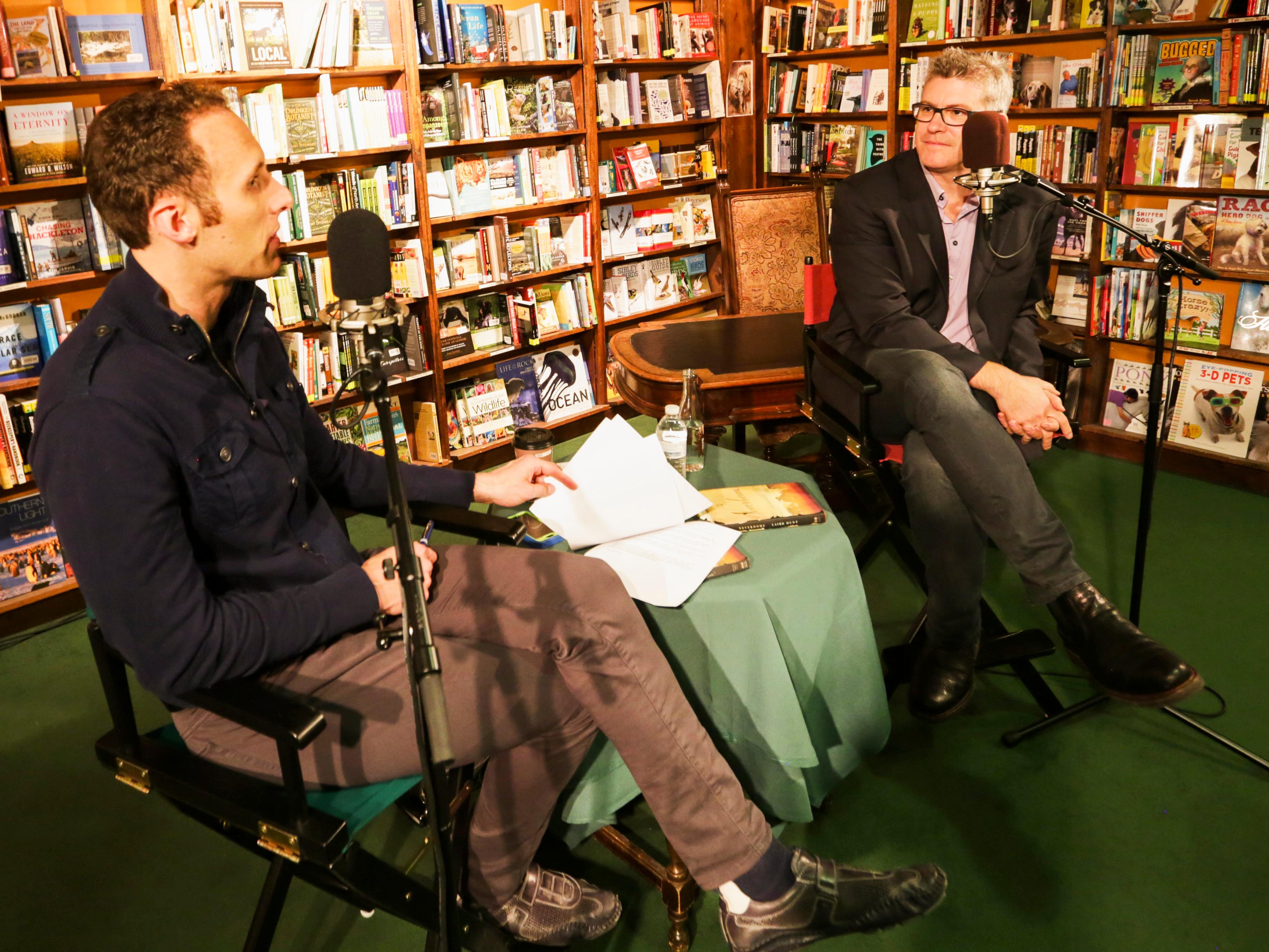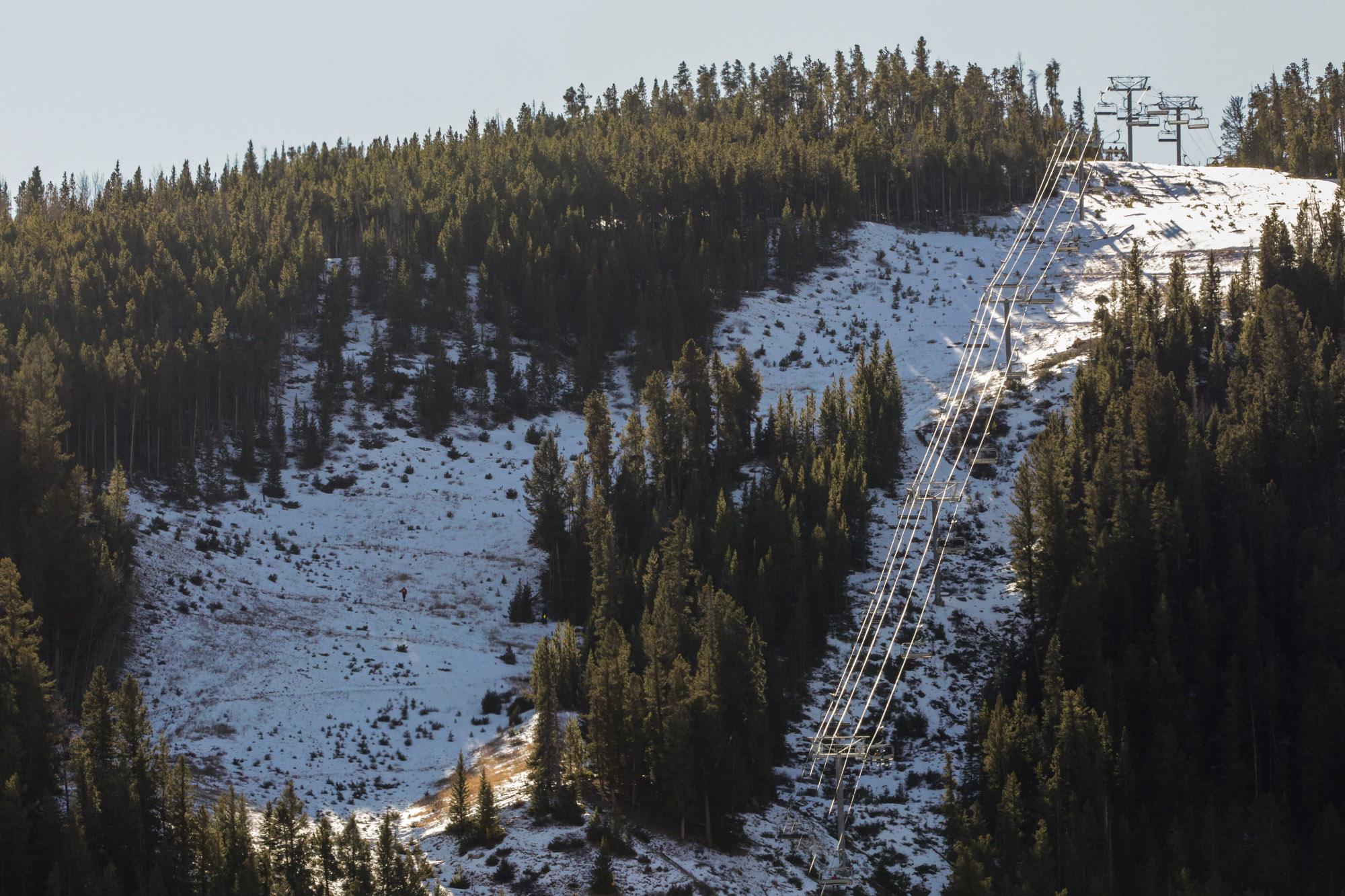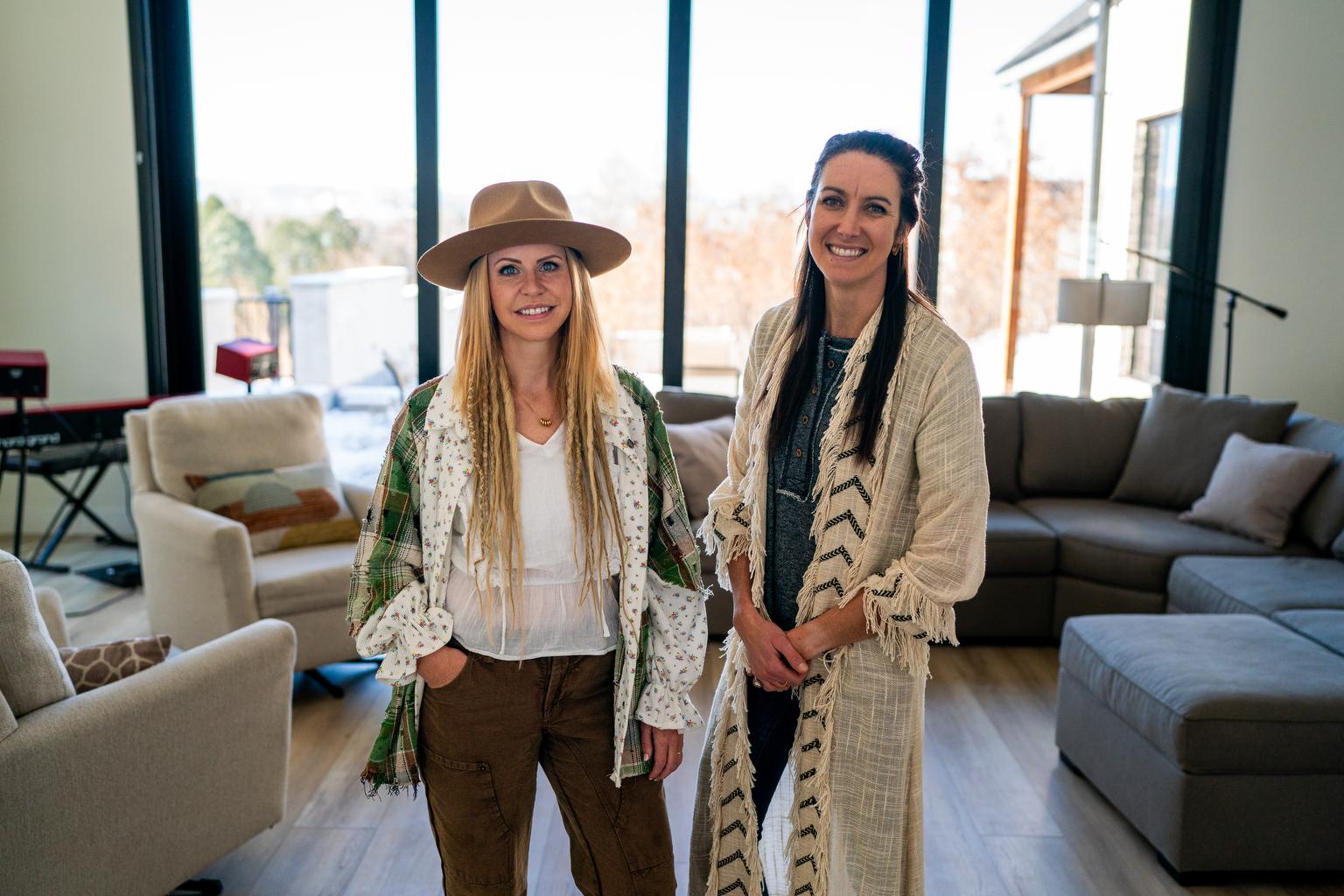
The seeds for Boulder author Laird Hunt's new novel "Neverhome" were sewn nearly 20 years ago when his wife handed him the book "An Uncommon Soldier," about a woman who fought as a man in the Civil War.
"These were the letters home of a woman who went to war and fought under the name Lyons Wakeman and became a corporal and served the Union army for two years. This story stuck with me," says Hunt.
Hunt says close to a thousand woman are believed to have done this.
"Quite a number of these women indeed were discovered and they were summarily dismissed from service. This was absolutely illegal what they were doing. And what I love about some of these women is that quite a number of them simply went down the road and joined another regiment."
Hunt's main character, Constance, transforms herself into Ash Thompson and leaves her husband behind to fight.
Hunt, who lives in Boulder, teaches creative writing at The University of Denver. He holds an MFA in Writing and Poetics from the creative writing program at Naropa University and teaches at that school's Summer Writing Program.
You can watch the book trailer here and read the first chapter below:
I was strong and he was not, so it was me went to war to defend the Republic. I stepped across the border out of Indiana into Ohio. Twenty dollars, two salt-pork sandwiches, and I took jerky, biscuits, six old apples, fresh underthings, and a blanket too. There was a heat in the air so I walked in my shirtsleeves with my hat pulled low. I wasn’t the only one looking to enlist and by and by we had ourselves a band. Farm folk cheered as we went by. Gave us food. Their best shade to stop in. Played to us on their fiddles. Everything you’ve heard about from the early days, even though it had already been a year since Fort Sumter, and there had already been the First Bull Run, and Shiloh had stole off its souls, and the early days were done and dead and gone. The tenth or eleventh night on the road we drank whiskey and hollered under the stars. There was a running race. Knife throwing. Cracker-swallowing contest. Feats of strength. One of the boys tried to arm wrestle me and got the back of his hand scraped when I smacked it down. None of the others took a turn. There was an old lady outside Kettering fetched me up a drink of water from her well, took a long look at me as she handed it to me, and told me I needed to watch my step. No one else outside that lady saw what I was. I slept just exactly like a pine plank on that walk. I sent Bartholomew my first letter from Dayton. I sent him about the same one from Cincinnati. I wrote that I missed him fierce. I wrote that I was fierce happy too. I gave my name as Ash Thompson down out of Darke County. “Where in Darke County?” they asked me, and I told them, even though I could see straight off they weren’t listening, that where was in the northwest corner of that fine county on my Daddy’s farm. After they had cracked on my teeth and whistled at my thick fingers and had me scrape my thumb calluses across the wood tabletop, they gave me my blues. A week later, when they saw I didn’t mind work and hadn’t run off, they handed me my firearm. It was a Model 1861 muzzle-loading Springfield rifle with flip‑up sights and percussion lock, and they said you could use it to kill a man a quarter mile away. That was something to think about. How you could rifle a man down was looking at you and you at him but never see his face. I hadn’t figured it that way when I had thought on it back home. I had figured it would be fine big faces firing back and forth at each other, not threads of color off at the horizon. A dance of men and not just their musket balls. There was another fellow, little bitty thing made me look tall, said something not too far off these lines aloud as we stood there staring at our Springfields. “Don’t you worry, sweetheart,” said to him the officer was handing out the hardware, “you’ll get so close to those rebel boys you won’t know whether to kiss or kill.” We marched ragtag for several days south and came to a great camp near the river. They gave me a shovel to go with my rifle and set me to digging fresh latrines. Some already there had it in their minds my first day to strip me down and throw me in the creek, but one of the band I’d come in with said it wasn’t worth the trouble I would give them if they tried it, so they picked on someone else instead. I stood on the bank and laughed with the others when they had him down to his dirty skin, but it was me who waded in when it came out he couldn’t swim. I wasn’t sorry after I’d fetched him, as the wet and cool settled off some of my stink. That evening I walked a ways down the creek past all the eyes and shucked off my own clothing and went back in. I’d have floated on my back a good long while but I could already see that a camp was a sprawly thing and who knew who else might have had the same idea, so I got in and out and dried and dressed back up quick. The boys at my tent had a game of cards going when I got back and I stood awhile and watched it. In between bets they talked about all the rebel-whipping to come. They had pipes in their mouths, and cheeks still fat from their farms. I did not know what was coming any better than they did but it did not feel like a thing to rattle happy at the dark about. Still, when one of them looked up from his poor hand and asked how many rebels I planned on killing, I smiled and put my own pipe in my mouth and said I’d get my hundred. A little later after I had tended to my gun and polished my bayonet I lay under my blanket and thought about that hundred. I thought about my Bartholomew too. I thought about the hundred then I thought about Bartholomew then I fell asleep and dreamed I was floating dead as the ages in the cool waters of the creek. We had talked on it for two months before I went. I think we both of us knew from the start where the conversation was wending but we talked on it, took it every angle, sewed at it until the stitch stayed shut. I was to go and he was to stay. There was one of us had to look to the farm and one had to go and that was him and that was me. We were about the same small size but he was made out of wool and I was made out of wire. He took the sick headache every winter and I’d never got sick one gray day in my life. He couldn’t see any too well over a distance and I could shut one eye and shoot a jackrabbit out of its ears at fifty yards. He would turn away any time he could, and I never, ever backed down. He said we didn’t either one of us have to go and I said someone wasn’t him had to go and represent this farm and after I put the bark on my words and said it a few times that settled up the argument. We kept it quiet. The only other person I raised up the topic with was my mother and of course she was already fine and dead. I would open the discussion with her after Bartholomew was into his snoring or when we were at different ends of the field or when it was my turn to go out to the shed and lay my cheek and shoulder against our cow. Once or twice I went out to the churchyard where I’d put her stone. Curried off its fresh slime and damp mosses and twittered at it like a bird. My mother had traveled in a train once and I told her I wanted to travel like her. Whoosh across the countryside, float the length of its long waters in a boat. I wanted, I told her, to lie under the stars and smell different breezes. I wanted to drink different waters, feel different heats. Stand with my comrades atop the ruin of old ideas. Walk forward with a thousand others. Plant my boot and steel my eye and not run. I said all this to my dead mother, spoke it down through the dirt: there was a conflagration to come; I wanted to lend it my spark. We both of us, me and Bartholomew, knew what my mother would have said in response and so it was like she was saying it each time I asked her what she thought. Go on. Go on and see what you got. We had drill every day at that camp. We filled up our bags and toted our muskets and we marched long miles out into nowhere and back and we stood at attention for inspection and spent every second we stood there wishing the hot weather would turn. I finished up at drill and dug at the trenches and at any other thing required a shovel. Once it was a sinkhole for the cooks. Another time it was a row of fresh neat graves I helped dig and then fill. Boys they put in them had died of diphtheria. One or two was ones I had walked into camp with. Five-minute funerals were but one of our many fine diversions. There was stealing and drinking and fighting too. There was a little stage where they would get up farces about the officers or stories I knew well, like the little man could spin gold or that poor boy and girl who laid down their bread crumbs in the woods. I heard one fellow say that since those two got free at the end and didn’t get cooked in an oven they were lucky, but there was another said, You get a scare like that put deep into you when you are young, it never comes all the way out. Whether it does or it doesn’t, we also had minstrel shows for our entertainment or actual Negroes free from bondage to dance for us or sing. There was a giant contraband they said had come up out of Tuscaloosa on an earless donkey did his song for us on a platform he had balanced on the top of a fence post. When the song was done he bowed then flipped off that platform backward and onto the ground. He did this so well the boys had him do it again. The third time, when the crowd had swelled up to almost half the regiment, he landed bad off his jump and broke his leg. It wasn’t just contraband could offer up marvels. A Mexican boy worked in the kitchen tents could play the banjo so fast his hand would vanish clear off the strings, and there was plenty said in hushed voices when it came to picking, it was only the devil on his good day had him beat. Some afternoons the officers would get up contests. The whiskey would go around on those days and the boys would run races or fight each other with their bare fists or play a kind of baseball involved old apples we didn’t yet know we’d want later or climb up greased poles. The camp was about as far away as you could gallop in a day from what you would have called a pretty place. There was torn‑up pasture fields around us and half the woods cut down for timber and firewood. There was a stink out of a old storybook doing its dance on any breeze might come our way. Men blowing along their own ugly breezes went every which direction, some on horse though most on foot, and there was a little line of cannon they would fire off every now and again when there wasn’t enough smoke and devil smell around to suit them. The tents were dark places, for all that the men would lay down floors and hang up likenesses and sundries from home. Sometimes there were women in the camp. But whether they were officers’ wives or pot scrubbers or ladies had long ago lost their virtue, I kept clear of them. When I’d eaten up my given share of a day I’d take up my pen to write Bartholomew. I had never written him or anyone else a letter before those days in my life and I did not much like the look of what I found I had to say. I have improved some at writing since, as you can be the judge, but I was slow at my writing back then and using my pen to make words that would still mean something after traveling so many miles seemed a strange chore. I would read through my letters before I posted them off and it seemed like I was reading the letters of a stranger to a stranger and I did not like the way this made me feel. My Dear Bartholomew, Dearest Bartholomew, Bartholomew, My Handsome Friend, Back home it was words spoke aloud or little presents and notions we would leave for each other that had done the trick. We had a game between ourselves to be the one to see the first daffodil come up in the springtime, the first tulip, the first iris cracking open the fresh purple yolk of its bloom. Whoever saw it was to pick that first one and put it out for the other to find. That spring before I left for the fight it was Bartholomew had seen the first lilac. He tied some sprigs into a little bundle with yellow thread and set it out next to my breakfast bowl. I thought on that bright bundle more than once in my writings to see if there was any fair firsts I could signal to him, but all that came into my mind were latrines and ugly bare backs set to labor and burned coffee and mealworms popping their heads out of our hard biscuits. One day on a march I did see a blue heron spear a fish bigger than its beak out of a still puddle but when I wrote it down, the heron and the fish and the puddle came out so pale I almost struck them out. Bartholomew’s letters to me were of another order altogether. He had a way of writing five words could bring all of the old world back to life. Reading his letters I could smell the early smells of autumn and hear the early autumn sounds. One time he put a bright red cardinal feather in the envelope and told about finding it “aflit at the edge of the well” into which it might have fallen forever had he not plucked it up and sent it to fly far across the world to find me. I cannot tell you quite why but that feather and his words about it flying far to find me put a tear into the corner of my eye wouldn’t leave even after I had wiped it away. I wasn’t the only one got my face flushed at a letter from home. Some got much worse than that. There was young boys got letters from their mothers who bawled like babies all the rest of the night. One time, I saw an old sergeant sent a pair of fresh-knit socks from his wife had to work hard to bite back the tears. A pair of fellows sitting nearby tried to tease him some but he told them if they kept it up one more minute he would stick a fork in each of their eyes. It was that same sergeant taught us how to fix bayonets in our Springfields and stab at men made of straw and form a line and, for those that didn’t know how already, shoot. I already said earlier I knew how to shoot, and fifty yards or five hundred, it wasn’t much different in that camp. I could make my Springfield hit whatever it was they wanted me to wherever they wanted to put it and it didn’t matter if they stood behind us while we were at it and yelled in our ears or beat to breaking on a drum. There was plenty who could march or stand longer than I could or stab straw fiercer, but it was only a few could beat me with a gun. I wrote Bartholomew about it, and in the next letter I had from him he said that was fine and I ought to be proud but that—like we had talked about—if I didn’t want the curious eyes of the entire company on me, every once in a while I needed to miss. I wrote him back that maybe it wouldn’t be so awful a thing to get noticed for what I was and sent home. He wrote that he wanted me back with him more than anything on the green good earth but that I shouldn’t come. That he knew I wasn’t ready to come home yet, that if I didn’t stay to see some of the fight I would forever be filled with the echoes of regret and the ague of remorse. There was a fellow had his tent near ours who looked wiser than the others and I asked him after I had had this letter from Bartholomew whether he thought love ought to trump duty. “Love? What in hell is love?” said this wise-looking man and spat. Excerpted from the book NEVERHOME by Laird Hunt. Copyright © 2014 by Laird Hunt. Reprinted with permission of Little, Brown and Company. |









